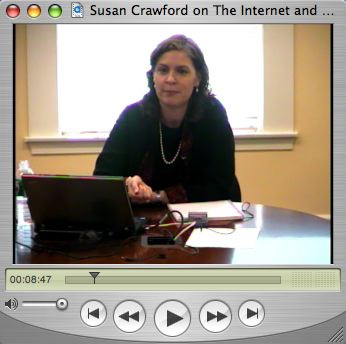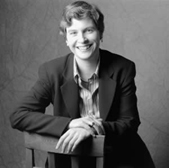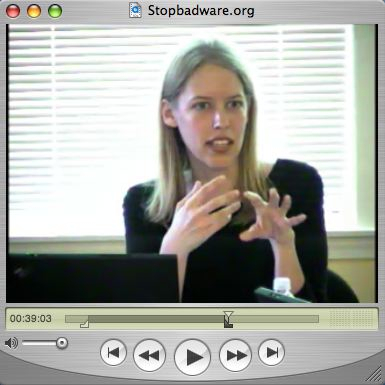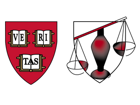Posts filed under 'Regulation'

Ron Deibert, Associate Professor of Political Science and Director of the Citizen Lab at the Munk Centre for International Studies, University of Toronto. Prof. Deibert, who is also a principal investigator in the Open Net Initiative, discusses “Securing Human Rights Online: Addressing Long-term Problems of Sustainability, Coordination, and Resource.”
 Download the MP3 (time: 1:03:01).
Download the MP3 (time: 1:03:01).
January 30th, 2007

Click To Play Video
Susan Crawford of Cardozo Law School discusses “The Internet and the Project of Communications Law,” focusing on the way the internet’s uniqueness as a social communications tool should affect the way we think about regulating it.
January 9th, 2007
 Susan Crawford of Cardozo Law School discusses “The Internet and the Project of Communications Law,” focusing on the way the internet’s uniqueness as a social communications tool should affect the way we think about regulating it.
Susan Crawford of Cardozo Law School discusses “The Internet and the Project of Communications Law,” focusing on the way the internet’s uniqueness as a social communications tool should affect the way we think about regulating it.
 Download the MP3 (time: 57:26).
Download the MP3 (time: 57:26).
January 9th, 2007

Click To Play Video
Stopbadware.org is a Neighborhood Watch campaign aimed at fighting badware – spyware and other programs that can damage an internet user’s computer and lower citizen confidence in the internet itself. The project’s goal is to provide reliable, objective information about downloadable applications in order to help consumers to make better choices about what they download. The StopBadware team tests and reports on websites and software suggested by the public, noting as badware those programs that engage in potentially objectionable behaviors without adequately informing the user and seeking their consent.
Christina Olson, Berkman Center fellow and the project manager for StopBadware, led the lunch discussion. She recently graduated cum laude from Harvard Law School, where she worked at the Harvard Journal of Law and Technology as editor-in-chief, technical editor, production editor, and line editor. Christina was joined by the StopBadware staff team.
Video produced by Indigo Tabor and Colin Rhinesmith.
December 7th, 2006

StopBadware.org presents at the Berkman Center on December 6, 2006.
 Download the MP3 (time: 1:00:32).
Download the MP3 (time: 1:00:32).
Stopbadware.org is a Neighborhood Watch campaign aimed at fighting badware – spyware and other programs that can damage an internet user’s computer and lower citizen confidence in the internet itself. The project’s goal is to provide reliable, objective information about downloadable applications in order to help consumers to make better choices about what they download. The StopBadware team tests and reports on websites and software suggested by the public, noting as badware those programs that engage in potentially objectionable behaviors without adequately informing the user and seeking their consent.
Christina Olson, Berkman Center fellow and the project manager for StopBadware, led the lunch discussion. She recently graduated cum laude from Harvard Law School, where she worked at the Harvard Journal of Law and Technology as editor-in-chief, technical editor, production editor, and line editor. Christina was joined by the StopBadware staff team.
Produced by Indigo Tabor and Colin Rhinesmith.
December 7th, 2006
 Susie Lindsay discusses “Television in Transition”, public interest values in a shifting media landscape.
Susie Lindsay discusses “Television in Transition”, public interest values in a shifting media landscape.
Susie Lindsay is a research fellow at the Berkman Center, working on the Digital Media Project. Her research interests include communications law, mass media law, and the impact of the transition from analog to digital media on artists, consumers, and the media industries.
She writes:
“In the shifting media landscape – as broadcast and the internet merge – what are the public interest values and how do we achieve them?”
We’ll hear Susie speaking at a Berkman Tuesday Luncheon, July 11, 2006.
 Download the MP3.
Download the MP3.
Produced by Colin Rhinesmith on July 12, 2006.
Download Susie Lindsay’s PowerPoint presentation.
Attribution: Music from this episode of AudioBerkman was sampled and remixed using a track from Antony Raijekov titled Be Brave (Dub-TripHop RMX).
July 12th, 2006
 Jack Goldsmith, Professor of Law at Harvard, talks about “Who Controls The Internet: Illusions of a Borderless World?”.
Jack Goldsmith, Professor of Law at Harvard, talks about “Who Controls The Internet: Illusions of a Borderless World?”.
A new book co-written with Columbia Law School Professor, Tim Wu. The book asks the following questions, “Is the Internet erasing national borders? Will the future of the Net be set by Internet engineers, rogue programmers, the United Nations, or powerful countries? Who’s really in control of what’s happening on the Net?”
On this edition of AudioBerkman, we’ll hear from Jack Goldsmith speaking at the Berkman Center for Internet & Society at Harvard Law School.
Download the MP3.
Produced by Colin Rhinesmith.
Attribution: Music for this edition for AudioBerkman was sampled and remixed from a track by mystro titled Mystro Soul Instrumental.
May 23rd, 2006
 David Isenberg, Berkman Fellow and co-organizer of this year’s F2C: Freedom to Connect conference in Washington, D.C. discusses the issue of Network Neutrality and challenges facing the Internet by the largest telephone companies, the FCC, and Congress.
David Isenberg, Berkman Fellow and co-organizer of this year’s F2C: Freedom to Connect conference in Washington, D.C. discusses the issue of Network Neutrality and challenges facing the Internet by the largest telephone companies, the FCC, and Congress.
Download the MP3 (time: 1:13:17)
Download the Powerpoint.
May 3rd, 2006
 Yochai Benkler, Professor of Law at Yale University, explores the effects of laws that regulate information production and exchange on the distribution of control over information flows, knowledge, and culture in the digital environment.
Yochai Benkler, Professor of Law at Yale University, explores the effects of laws that regulate information production and exchange on the distribution of control over information flows, knowledge, and culture in the digital environment.
Professor Benkler discusses these and other topics from his new book, The Wealth of Networks: How Social Production Transforms Markets and Freedom. The Wealth of Networks is a comprehensive social theory of the Internet and the networked information economy. In it, Professor Benkler describes how patterns of information, knowledge, and cultural production are changingand shows that the way information and knowledge are made available can either limit or enlarge the ways people can create and express themselves.
Professor Lawrence Lessig of Stanford Law School has written about Yochai Benklers book, The Wealth of Networks. He says, This is by far the most important and powerful book written in the fields that matter most to me in the last ten years. Read it, Professor Lessig says. Understand it. You are not serious about these issues on either side of these debates unless you have read this book.
Yochai Benklers lecture was presented on April 18, 2006 at Harvard Law School, hosted by The Berkman Center for Internet & Society.
Produced by Colin Rhinesmith.
Download the MP3 (time: 41:22)
Attribution: Music from this episode of AudioBerkman was sampled and remixed using a track from Antony Raijekov titled Be Brave (Dub-TripHop RMX).
April 23rd, 2006
Next Posts
Meta
License

Unless otherwise noted this site and its contents are licensed under a Creative Commons Attribution 3.0 Unported license.

 Download the MP3 (time: 1:03:01).
Download the MP3 (time: 1:03:01).
 Susan Crawford
Susan Crawford





